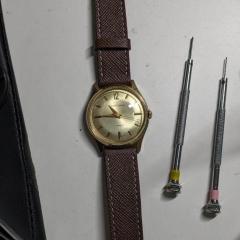Help with finding full time horologist schools in NYC?
-
Recently Browsing
- No registered users viewing this page.
-
Topics
-
Posts
-
Hi Watchrepairtalk, I have some questions about part sourcing I was hoping someone here might be able to help with. I'm working on an FHF 180 movement with a broken balance staff, broken regulator pins, and damaged cap jewels (both top and bottom). Some Googling says that this is similar to other FHF calibers like 150s, 160s, 180s and so on but I can't figure out what the functional difference is between these movements. Is there any reason I wouldn't be able to acquire a donor FHF 150 or similar (with no shock protection) and use parts from that or would it be smarter to source replacements individually? Also are there any sources someone could recommend to get bulk cap jewels like this? Thank you for the help!
-
interesting video nice to see the machine what it can do now I wonder what it costs and I'm sure it's not in my budget. Plus the video brought up questions but the website below answers the questions? What was bothering me was the size of his machine 4 mm because I thought it was bigger than that? But then it occurred to me that maybe they had variations it looks like four, seven and 10. With the seven and 10 being the best because way more tool positions in way more rotating tools. Although I bet you all the rotating tools are probably separate cost https://www.tornos.com/en/content/swissnano Then as we been talking about Sherline. Just so that everyone's aware of this they have another division their industrial division where you can buy bits and pieces. I have a link below that shows that just in case you don't want to have the entire machine you just need bits and pieces. https://www.sherline.com/product-category/industrial-products-division/ Let's see what we can do with the concept I explained up above and bits and pieces. For one thing you can make a really tiny gear very tiny like perhaps you're going to make a watch. Then another version the center part is not separate it is all machined from one piece. Then fills gear cutting machines have gone through multiple of evolutions. A lot of it based on what he wanted to make like he was going to make a watch unfortunately eyesight issues have prevented that. Another reason why you should start projects like this much sooner when your eyesight is really good or perhaps start on watches first and then move the clocks then local we have from the industrial division? Looks like two separate motors and heads. Then it's hard to see but this entire thing is built on top of a much larger milling machine as a larger milling machine gave a very solid platform to build everything. Then like everything else that had multiple generations are versions the indexing went through of course variations like above is one version and the one below was the last version. Now the version below I mentioned that previously and somewhere in the beginning to discussion and somebody else had one in their picture. As it is a really nice precision indexing. Then I wasn't sure if I had a the watch photos here is his unfinished watch. No he wasn't going to make a simple watch like none of his clocks were simply either what would be the challenge and that.
-
Some of the Chinese tools ae great and can be purchased at a fraction of the price of Swiss ones, some are complete garbage and some I'm convinced are coming out the same factory as the branded ones.
-






Recommended Posts
Join the conversation
You can post now and register later. If you have an account, sign in now to post with your account.
Note: Your post will require moderator approval before it will be visible.